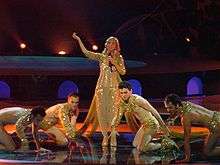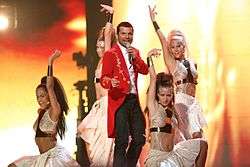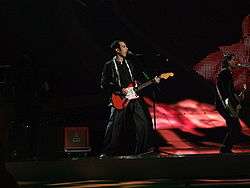Turkey in the Eurovision Song Contest
Turkey has participated in the Eurovision Song Contest 34 times since 1975. Since the introduction of the semi-finals in 2004, the only year that Turkey participated and failed to advance to the finals was in 2011. Turkey won the contest once in 2003, and hosted the 2004 contest in Istanbul.
| Turkey | |
|---|---|
 | |
| Member station | Turkish Radio and Television Corporation (TRT) |
| National selection events | National final
Internal selection
|
| Participation summary | |
| Appearances | 34 (33 finals) |
| First appearance | 1975 |
| Last appearance | 2012 |
| Best result | 1st: 2003 |
| Worst result | Last: 1975, 1983, 1987 |
| Nul points | 1983, 1987 |
| External links | |
| TRT page | |
| Turkey's page at Eurovision.tv | |
Turkey in the Eurovision Song Contest 2012 | |
Turkey finished last on its debut at the contest in 1975, and went on to finish last with "nul points" in 1983 and 1987. They reached the top ten for the first time in 1986. Şebnem Paker achieved the country's first top five result in 1997, finishing third with the song "Dinle".
They went on to achieve five more top five placements after the introduction of the free language rule and televoting, with Sertab Erener giving Turkey its first victory in 2003 with the song "Everyway That I Can", narrowly defeating Belgium by two points. Turkey's other top five results are Athena (2004), Kenan Doğulu (2007), Hadise (2009), who all finished fourth, and the nu metal band maNga (2010), who finished second.
The TRT announced in December 2012 that they would not attend the 2013 contest in Malmö, citing dissatisfaction with the rules of the competition.[1] 2013 was the first time since 1973 that there was no television broadcast of the Eurovision Song Contest on TRT. In September 2013, TRT stated a return is unlikely for the 2014 competition, citing the same reasons.[2][3]
History
Turkish Radio and Television Corporation involvement in the Eurovision Song Contest
The national broadcasting service of Turkey, the Turkish Radio and Television Corporation (TRT), was one of the charter members of the European Broadcasting Union (EBU) in 1950 along with eighteen countries around Europe, including Tunisia. As an intercontinental country (with lands in Eastern Thrace and Western Asia), Turkey takes part in a multitude of Western organizations including NATO as of 1952 and the European Economic Community as an associate member as of 1959.
TRT televised the Eurovision Song Contest between 1973 and 2012, even during years in which Turkey was not participating in the contest.
1970s
Turkey participated in the 1975 Eurovision Song Contest held in Stockholm, Sweden. Greece did not take part in the 1975 Contest for "unknown reasons" according to the EBU, but it was later revealed that the withdrawal was in protest of Turkey's debut and their invasion of Cyprus in 1974.[4][5] TRT organized a national final to select the first ever Turkish entrant to the Eurovision Song Contest. The final took place on 9 February 1975 in the studios of TRT and was hosted by Bülend Özveren. The winning song, "Seninle Bir Dakika" (literally "A minute with you") by Semiha Yankı, was picked by averaging the ranks from the professional jury and people's jury. At the close of voting during the contest, the song received only 3 points from Monaco and placed last.
In 1976, Greece's entry to the contest aroused controversy due to its subject matter being the Turkish invasion of Cyprus. Turkey withdrew from the contest to protest the political background of Greece's entry, called "Panagia Mou, Panagia Mou." Turkey televised the final on 3 April 1976 but censored the Greek entrant's performance. They played a nationalist Turkish song titled "Memleketim" (literally "My motherland", the Turkish cover of the Yiddish folk song "Rabbi Elimelekh"), which was one of the symbols of the Turkish invasion of Cyprus in Turkey.
Turkey did not take part in the contest again until 1978, placing 18th with the song "Sevince" performed by Nazar and Nilüfer.[6]
The 1979 contest was held in Jerusalem. The Turkish entry selected was "Seviyorum" (literally "I'm in love") by Maria Rita Epik. However, Turkey withdrew from the contest due to pressure from neighboring countries to do so, which arose from ongoing controversy regarding the status of Jerusalem.
1980s
Turkey participated in the Eurovision Song Contest consistently throughout the 1980s. In 1980, Turkish superstar Ajda Pekkan and the song "Petrol" was selected by TRT through a national final. Pekkan placed 15th with 23 points, including the first ever score 12 points received by Turkey, coming from Morocco.
Turkey had their best result (until 1997) in the 1986 contest in Bergen, Norway, when Klips ve Onlar placed ninth with a total of 53 points. The country scored "nul points" twice in the eighties, one in 1983 (shared with Spain) and the other one in 1987. Several famous Turkish artists performed for the contest during the 1980s, including Ajda Pekkan, Neco, Candan Erçetin and MFÖ.
1990s
The contest's popularity in Turkey suffered after Kayahan, one of the most famous singers in the country, placed 17th out of 22 participating countries with 21 points. After Kayahan's poor result, Turkey's Eurovision entrants were mostly unknown or amateur singers until 2003.
Şebnem Paker represented the country in two consecutive years. The first time being in 1996 where she qualified for the final and placed 12th, and the second in 1997 where she placed third, behind the UK and Ireland, with the song "Dinle" ("Listen"), sung in Turkish.
After the free language rule was re-introduced in 1999, the first Turkish entry to be partially sung in English was at the 2000 contest. Turkey reached the top 10 for a second time since 1986, and landed in the top three for the first time, making it the most successful result for the country until its victory in 2003. Şebnem Paker returned to the Turkish national final in 1998, but placed fourth and did not qualify for the Contest as the Turkish participant for a third consecutive year. Tüzmen represented the country and placed 14th. Turkey participated all the series of the contest in the 1990s except for the 1994 contest, from which they were relegated due to their 21st-place finish in 1993.
2000s and 2010s
In the late 1990s to early 2000s, the contest became one of the most popular events in Turkey as a result of the participation of other Eastern European countries, and the victory of Sertab Erener with the song "Everyway That I Can". Following the introduction of televoting in 1998, (initially trialed in 1997 and first implemented in Turkey in 1999), Turkey went on to achieve eight top 10 results in the contest, having previously made the top 10 in 1986 and 1997.
Erener's song for 2003 was the first Turkish entry in the contest to be sung completely in English. TRT selected the Turkish entry through an internal selection mainly organised by OGAE Turkey.
The 2004 contest was held in the Abdi Ipekci Arena, with the first ever semi-final held on Wednesday 12 May, followed by the final on Saturday 15 May. After Erener's victory (with the exception of the 2004 and 2005 contest), Turkish entries to the Contest were picked internally. Turkey had always qualified to the grand final (except for the 2011 Contest in Düsseldorf) since introduction of the semi-finals in 2004 and always reached the top ten, except in 2005 and 2006, until the last contest they participated in (as of 2018) in 2012. From 2000, Turkey had seven songs sung in English and four sung in both English and Turkish, with just two (2005 and 2008) songs sung entirely in Turkish.
Along with Greece, Turkey brought the contest a new outlook with flashy stage performances and dresses alongside their oriental/Mediterranean-flavoured pop music acts (Sertab Erener, Sibel Tüzün, Kenan Doğulu and Hadise). In 2004, 2008, 2010 and 2011, the country was represented by bands, most being with rock-influenced songs with Ottoman, Eastern European and Balkan instruments. Athena ranked fourth in 2004, when the contest was held in Istanbul; Mor ve Ötesi ranked 7th with a song completely in Turkish in 2008 and the nu metal band maNga, which was named the Best European Act in the MTV Europe Music Awards 2009, ranked 2nd in the Eurovision Song Contest 2010 respectively. Although Yüksek Sadakat in 2011 placed 13th in the first semi-final of the contest and failed to qualify, this was the first and only time that Turkey didn't qualify for the final. In 2012 Turkey participated to the Eurovision Song Contest for the last time as of 2018 with the song "Love Me Back" completely sung in English by up-and-coming artist Can Bonomo, which qualified for and placed seventh in the final with 112 points.
Withdrawal and controversy
TRT announced their withdrawal from the Eurovision Song Contest 2013 on 14 December 2012, citing dissatisfaction with the rules of the competition; they have yet to return.[1] The TRT cited the changes to the televote voting system, in which a jury was introduced and the significance of televoting decreased by 50%. Televoting was instated with the purpose of boosting ratings for the Song Contest.[7][8][9]
For the first time, TRT did not televise the 2013 contest, nor did it broadcast the 2014 contest. Turkey did not participate in any of the contests from 2015 through 2020.[10][11][12] In August 2018, İbrahim Eren, the General Manager of TRT, stated that TRT does not plan to rejoin the contest and break the boycott for various reasons, citing Conchita Wurst's representation for Austria in 2014.[13][14]
Contestants
1 |
Winner |
2 |
Second place |
3 |
Third place |
◁ |
Last place |
X |
Entry selected but did not compete |
| Year | Artist | Language | Title | Final | Points | Semi | Points |
|---|---|---|---|---|---|---|---|
| Semiha Yankı | Turkish | "Seninle Bir Dakika" | 19 ◁ | 3 | No semi-finals | ||
| Nilüfer and Grup Nazar | Turkish | "Sevince" | 18 | 2 | |||
| Maria Rita Epik and 21. Peron | Turkish | "Seviyorum" | Withdrew[lower-alpha 1] X | ||||
| Ajda Pekkan | Turkish | "Pet'r Oil" | 15 | 23 | No semi-finals | ||
| Modern Folk Trio and Ayşegül | Turkish | "Dönme Dolap" | 18 | 9 | |||
| Neco | Turkish | "Hani?" | 15 | 20 | |||
| Çetin Alp and The Short Waves | Turkish | "Opera" | 19 ◁ | 0 | |||
| Beş Yıl Önce, On Yıl Sonra | Turkish | "Halay" | 12 | 37 | |||
| MFÖ | Turkish | "Didai Didai Dai" | 14 | 36 | |||
| Klips ve Onlar | Turkish | "Halley" | 9 | 53 | |||
| Seyyal Taner and Lokomotif | Turkish | "Şarkım Sevgi Üstüne" | 22 ◁ | 0 | |||
| MFÖ | Turkish | "Sufi" | 15 | 37 | |||
| Pan | Turkish | "Bana Bana" | 21 | 5 | |||
| Kayahan | Turkish | "Gözlerinin Hapsindeyim" | 17 | 21 | |||
| İzel, Reyhan and Can | Turkish | "İki Dakika" | 12 | 44 | |||
| Aylin Vatankoş | Turkish | "Yaz Bitti" | 19 | 17 | |||
| Burak Aydos | Turkish | "Esmer Yarim" | 21 | 10 | Kvalifikacija za Millstreet | ||
| Arzu Ece | Turkish | "Sev" | 16 | 21 | No semi-finals | ||
| Şebnem Paker | Turkish | "Beşinci Mevsim" | 12 | 57 | 7 | 69 | |
| Şebnem Paker and Grup Etnik | Turkish | "Dinle" | 3 | 121 | No semi-finals | ||
| Tüzmen | Turkish | "Unutamazsın" | 14 | 25 | |||
| Tuba Önal | Turkish | "Dön Artık" | 16 | 21 | |||
| Pınar Ayhan and Grup SOS | Turkish, English | "Yorgunum Anla" | 10 | 59 | |||
| Sedat Yüce | Turkish, English | "Sevgiliye Son" | 11 | 41 | |||
| Buket Bengisu | Turkish, English | "Leylaklar Soldu Kalbinde" | 16 | 29 | |||
| Sertab Erener | English | "Everyway That I Can" | 1 | 167 | |||
| Athena | English | "For Real" | 4 | 195 | Host country[lower-alpha 2] | ||
| Gülseren | Turkish | "Rimi Rimi Ley" | 13 | 92 | Top 12 previous year[lower-alpha 3] | ||
| Sibel Tüzün | Turkish, English | "Superstar" | 11 | 91 | 8 | 91 | |
| Kenan Doğulu | English | "Shake It Up Şekerim" | 4 | 163 | 3 | 197 | |
| Mor ve Ötesi | Turkish | "Deli" | 7 | 138 | 7 | 85 | |
| Hadise | English | "Düm Tek Tek" | 4 | 177 | 2 | 172 | |
| maNga | English | "We Could Be the Same" | 2 | 170 | 1 | 118 | |
| Yüksek Sadakat | English | "Live It Up" | Failed to qualify | 13 | 47 | ||
| Can Bonomo | English | "Love Me Back" | 7 | 112 | 5 | 80 | |
- Notes:
- The 1979 contest was held in the Israeli capital Jerusalem. Although TRT had selected an entry via a national final, Turkey ultimately withdrew because Arab countries (one of them, Syria, being its southern neighbour) pressured the Turkish government to withdraw from the contest because of the dispute over the Status of Jerusalem.
- If a country had won the previous year, they did not have to compete in the semi-finals the following year.
- According to the then-Eurovision rules, the top ten non-Big Four countries from the previous year along with the Big Four automatically qualified for the Grand Final without having to compete in semi-finals. For example, if Germany and France placed inside the top ten, the 11th and 12th spots were advanced to next year's Grand Final along with all countries ranked in the top ten.
Congratulations: 50 Years of the Eurovision Song Contest
| Artist | Language | Title | At Congratulations | At Eurovision | |||||
|---|---|---|---|---|---|---|---|---|---|
| Final | Points | Semi | Points | Year | Place | Points | |||
| Sertab Erener | English | "Everyway That I Can" | Failed to qualify | 9 | 104 | 2003 | 1 | 167 | |
Hostings
| Year | Location | Venue | Presenters |
|---|---|---|---|
| 2004 | Istanbul | Abdi İpekçi Arena | Korhan Abay and Meltem Cumbul |
Awards
Marcel Bezençon Awards
| Year | Category | Song | Performer | Final | Points | Host city |
|---|---|---|---|---|---|---|
| 2003 | Press Award | "Everyway That I Can" | Sertab Erener | 1 | 167 |
Commentators and spokespersons
Prior to 2012 every contest Turkey had taken part in had always been commentated on by Turkish television presenter Bülend Özveren, with the exception of 1982–1985, 1990–1991, 1998–2001 and 2007. In addition Özveren also co-commentated the contest in 1979, 2004, 2011 and 2012. Out of the 38 years Turkey have broadcast the event Özveren has commentated on 29 of them making him 9 years short of being the contest's longest commentator.
| Year | Commentator | Spokesperson | Ref. |
|---|---|---|---|
| 1973 | Bülend Özveren | Did not participate | |
| 1974 | |||
| 1975 | Bülent Osma | ||
| 1976 | Did not participate | ||
| 1977 | |||
| 1978 | Meral Savcı | ||
| 1979 | Did not participate | ||
| 1980 | Başak Doğru | ||
| 1981 | |||
| 1982 | Ümit Tunçağ | ||
| 1983 | Başak Doğru | Fatih Orbay | |
| 1984 | |||
| 1985 | |||
| 1986 | Gülgün Feyman | Ümit Tunçağ | |
| 1987 | Canan Kumbasar | ||
| 1988 | Bülend Özveren | ||
| 1989 | |||
| 1990 | Başak Doğru | Korhan Abay | |
| 1991 | Canan Kumbasar | ||
| 1992 | Bülend Özveren | Korhan Abay | |
| 1993 | Ömer Önder | ||
| 1994 | Did not participate | ||
| 1995 | Ömer Önder | ||
| 1996 | |||
| 1997 | |||
| 1998 | Ömer Önder | Osman Erkan | |
| 1999 | Gülşah Banda | ||
| 2000 | Ömer Önder | ||
| 2001 | Meltem Ersan Yazgan | ||
| 2002 | Bülend Özveren | ||
| 2003 | |||
| 2004 | Didem Tolunay and Bülend Özveren | ||
| 2005 | Bülend Özveren | ||
| 2006 | |||
| 2007 | Hakan Urgancı | ||
| 2008 | Bülend Özveren | ||
| 2009 | |||
| 2010 | |||
| 2011 | Bülend Özveren and Erhan Konuk | Ömer Önder | |
| 2012 | |||
| 2013–2020 | No broadcast | Did not participate |
Photogallery
 Sertab Erener in the opening of the 2004 Contest.
Sertab Erener in the opening of the 2004 Contest. Kenan Doğulu at Helsinki (2007)
Kenan Doğulu at Helsinki (2007) Mor ve Ötesi at Belgrade (2008)
Mor ve Ötesi at Belgrade (2008)
.jpg)
See also
- Music of Turkey
- Turkey in the ABU TV Song Festival
- Turkey in the Bala Turkvision Song Contest
- Turkey in the Junior Eurovision Song Contest
- Turkey in the Turkvision Song Contest
- Turkish pop music
- Turks in Europe
References
- Jiandani, Sanjay (14 December 2012). "Turkey will not go to Eurovision in Malmö". esctoday.com. ESCToday. Retrieved 14 December 2012.
- Jiandani, Sanjay (7 November 2013). "Turkey: TRT will not participate in Eurovision 2014". esctoday.com. ESCToday. Retrieved 7 November 2013.
- "TRT, Eurovision'u yayınlamaktan vazgeçti!".
- "EUROVISION SONG CONTEST 1975" (in Greek). OGAE Greece. Retrieved 2008-08-30.
- Raycoff, Ivan; Robert Deayom Tobin (July 2007). A Song for Europe. Aldershot, Hampshire, England: Ashgate Publishing. ISBN 978-0-7546-5878-8.
- "Final of Paris 1978". Eurovision Song Contest. Retrieved 2019-09-03.
- "Türkiye Eurovision'da yok" (in Turkish).
- "TRT won't accept the Big 5 and high participation fees".
- "Why Have Turkey Withdrawn From Eurovision?".
- Jiandani, Sanjay (5 September 2014). "Turkey: TRT confirms no return to Eurovision in 2015". esctoday.com. ESCToday. Retrieved 5 September 2014.
- Jiandani, Sanjay (3 November 2015). "Turkey: TRT confirms non participation in Eurovision 2016". esctoday.com. ESCToday. Retrieved 3 November 2015.
- Jiandani, Sanjay (7 August 2017). "Turkey: TRT confirms non participation in Eurovision 2018". Retrieved 14 May 2018.
- "TRT Genel Müdürü'nden Eurovision açıklaması". ABC Gazetesi. 4 August 2018. Retrieved 4 August 2018.
- "Turkey to return Eurovision 'if no more bearded divas'". Hurriyet. 4 August 2018. Retrieved 4 August 2018.
External links
| Wikimedia Commons has media related to Turkey in the Eurovision Song Contest. |
- Lyrics of all Turkish Eurovision entries
- Points to and from Turkey eurovisioncovers.co.uk